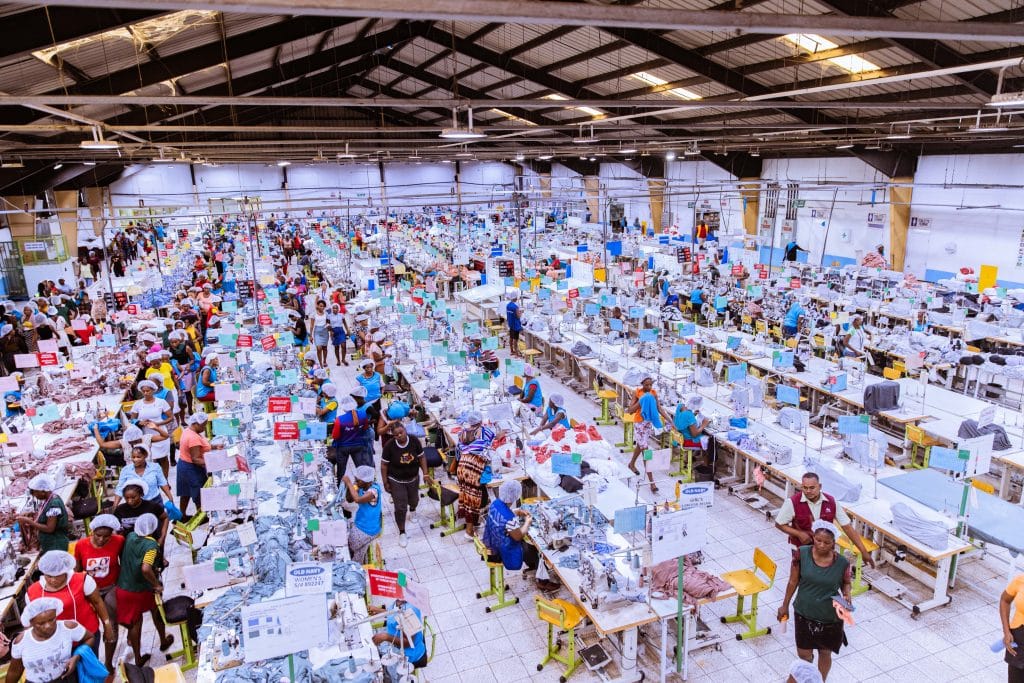The latest Better Work Haiti Synthesis Report (October 2023 – June 2024) offers a sobering snapshot of the industry’s struggles while highlighting the tenacity of Better Work and industry stakeholders’ responses.
PORT-AU-PRINCE – Haiti’s garment sector is in a precarious state, affected by the country’s social and political instability. Throughout 2023 and the first half of 2024, Haiti has faced escalating crises, taking a toll on the nation’s socio-economic health. Gang-related violence is profoundly impacting daily life, with effects spilling over into the labour market, livelihoods and the well-being of workers.
The garment industry has been seriously affected. Better Work Haiti’s most recent report delves into the data, revealing a troubling decline in operational factories, with one permanent and two temporary closures. The industry has seen a significant reduction in the workforce, with employment falling from 42,500 to 33,857 in just a few months, a loss of over 8,600 jobs.
The economic repercussions extend beyond factory closures. The U.S. Department of Commerce’s Office of Textiles and Apparel (OTEXA) reports a 30 per cent drop in textile exports to the United States, a key market for Haitian garments. This decline, from $345 million in May 2023 to $242 million in May 2024, underscores broader economic difficulties, including reduced demand and continuing global competition.
While recent political developments have sounded a note of cautious optimism, with the appointment of a Presidential Council, a new prime minister Garry Conille, and the arrival of a Kenyan peace-keeping force, the challenge to one of Better Work’s longest-running programs remains considerable.

A resilient response
Despite these challenges, Better Work Haiti and the industry have responded with resilience. The programme, in its 15th year of operations, continues to lead initiatives to promote social dialogue, enhance labour compliance, and improve working conditions within the sector.
Some factories have implemented rotations and production reductions. While these have affected workers’ incomes, they have also helped sustain operations. Additionally, in an April meeting of the Programme Advisory Committee (PAC – comprising government, employers’ and workers’ organizations), the employers’ association urged the government to act quickly to restore a safe environment for business activities.
One notable success during this period was developing a sectoral policy on Gender-Based Violence and Harassment (GBVH). Following workshops and tailored training for PAC members, the parties agreed to create a sectoral policy. A gap analysis was proposed and accepted to compare Haiti’s legal framework with ILO Convention 190 and Recommendation 206 on violence and harassment.
Additionally, a long-standing project to enhance the capacity of the Ministry of Labor and the Ombudsperson Office to provide effective monitoring services to factories has received a boost with ongoing logistical support and training. In a related effort, the programme has supported the development of a mobile app to build on the success of the Ombudsman’s Digital Complaint Management System.
Better Work has continued to perform compliance assessments to identify and address industry non-compliance issues. This includes working closely with factories to develop and implement improvement plans that address specific areas of concern, among them persistent non-compliance with OSH practices.
The synthesis report also found that non-compliance with social security contributions remains a serious issue, with approximately two-thirds of factories failing to comply with legal requirements primarily due to under-calculating contributions and late payments. Workers’ rights are also reportedly being undermined, as all factories in a prominent industrial park were found to violate freedom of association, including the wrongful dismissal of union members. Additionally, the suspension of the 3*8 Law (on working hours) has led to widespread breaches in labour regulations, including exceeding overtime hours.
Better Work Haiti is also conducting a sector crisis impact study, including a supply chain risk analysis, to identify, prevent, and minimise risks that could escalate into crises affecting the garment sector. The programme continues to work with national stakeholders to manage the current crisis state as well as non-compliance trends.
A continuing focus on open and transparent social dialogue at the factory and sectoral levels reinforces these positive initiatives. This includes providing advisory services and conducting training sessions to improve communication between workers and management, address non-compliance issues, and develop action plans. Sectorally, recent dialogue has yielded benefits in issue resolution, participation of international buyers and deeper government involvement in labour markets.
The road ahead for Haiti
A key factor in the sector’s potential recovery hinges on the renewal of key preferential trade policies, the Haitian Hemispheric Opportunity through Partnership Encouragement (HOPE) and the Haiti Economic Lift Program (HELP). In a meeting with leaders in the garment sector, Prime Minister Conille recently underlined the importance of the renewal of this legislation: “The Haitian textile industry is at a critical juncture, with urgent interventions needed to address insecurity, improve working conditions, and sustain economic stability through programs like HOPE/HELP.”
Claudine Francois remains determinedly optimistic. “Our approach is grounded in resilience and collaboration. We are not just focusing on short-term fixes but are working on building a sustainable framework that can withstand the pressures this industry faces. We continue to analyze the root causes of non-compliance and work towards long-term solutions that will benefit businesses and keep workers’ lives and livelihoods at the center.”